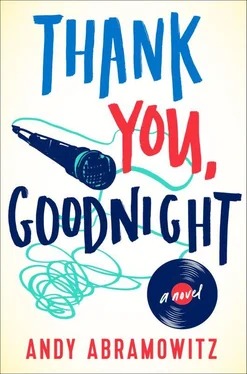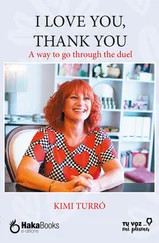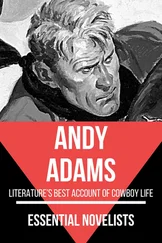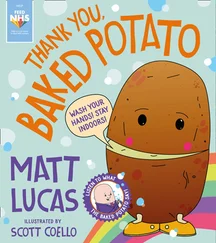I shook my head. “I’ve never admitted it to anyone. So, if you’re going to kill yourself, cool. If you’re not, I’d appreciate it if you kept it quiet.”
“Guys do some stupid shit for chicks,” he mused, as if we were now confederates. “Even screwing up their friends’ lives.”
“The thing is, they’re not screwed up. They’re all fine, maybe even better off. And who knows? Maybe touring with the Junction wouldn’t have been the boon everybody thought. Our second album really was a bit of a snore. Maybe a bigger tour would’ve just meant putting more people to sleep. Maybe there was just no saving us from us. We were what we were.”
“I take it it wasn’t happily ever after with the bass player either.”
I grunted through the window frame. “I’m not totally sure how she’s felt about me all this time,” I said, half-truthfully. “I just know it’s not the same way I’ve felt about her.”
I’d now talked this out to such an extent that the surest path to redemption was to join Duncan out on the ledge where the thin air really could right all your wrongs. If you just summoned the nerve to tumble into the low sky, all your hard decisions were made for you.
“At least you can do something about it,” Duncan said.
I looked at him.
“Just go tell all of them the truth. Apologize.”
I noticed I was nodding. Regardless of where Mackenzie stood on the issue of me, at least I knew where she stood on the issue of the band. Everybody was in, not because they needed to be, but because they wanted to be. Maybe I’d never again experience the giddy high of our first trip, but you’re only twenty-five once. Why couldn’t this be fun at thirty-eight? Wasn’t it already?
“So, anyway . . . ,” I heard Duncan say. “I don’t want to make this all about me, but what was the point of your story? Other than I’m not the only one on this ledge who sucks with girls.”
I looked down at him. “Let’s go downstairs and talk to Marin. I think it’ll help. It might not. Who knows? If after talking to her for five minutes you still want to kill yourself, I will personally walk you back up here and push you out the window.” He gauged my sincerity through a raised eyebrow. “I’ll do it. Ask anyone.”
Fidgeting with the frayed end of one of his shoelaces, he finally seemed on the verge of surrender.
“Things will turn around for you, Duncan. But not unless you stop quoting Coldplay. That’s gotta stop now.”
No sooner had I helped him through the window than he made for a plate of biscuits on the kitchen counter. They were scabrous things, the color of chewing tobacco and about as appetizing as a urinal puck.
While he snacked, I looked around and noticed that the ramshackle apartment was completely devoid of decoration. Until I started living with an interior designer, I’d never given much thought to what I surrounded myself with, but I wondered if that wasn’t part of Duncan’s problem. There was nothing to cover up the nothingness. A Heather Locklear pinup, a Che Guevara poster, one of those M.C. Escher mindfucks where the staircases never end—such things could be counted on to supply subtle psychological welfare that a blank wall of chipping paint did not.
I was about to offer some friendly advice on the subject when something over my shoulder caught my eye. Somehow I’d missed a canvas, a stunning oversized painting of a red 1970s convertible Trans Am coasting down an open highway. The view was from the rear, the Pontiac’s taillights zooming off into the dry afternoon heat, the car speeding away under a limitless sky toward mountains jutting fiercely in the distance. The artist had awarded the driver an unkempt flow of hair that seemed to be enjoying the ride as much as the driver himself. And in a nod to the bizarre, a nightmare-sized eel was sprawled out across the backseat, sloping over the side of the car. You couldn’t help but be drawn into the motion of the painting, the way the convertible was being propelled down the highway by nothing but freedom’s wind. Everything about the scene—the mountains, the sky, the driver’s hair—suggested the casting off of limits, a point underscored by the fantastically absurd eel, its slimy morphology lazing on the vinyl, along for the ride to a destination gloriously uncertain.
I had no idea what the significance of the eel was. Did it symbolize menace? Did it represent the past? Was it drying up and dying on the backseat? Did the driver even know the eel was back there? I couldn’t think of a reason why the answers to any of those questions would enhance or diminish the restless exhilaration that overcame me in the presence of this painting. At that moment, I would have given anything to dive into the passenger’s seat.
“ Trans Am with Electric Eel ,” Duncan said, watching me study the piece.
I wished I could make music that made people feel the way this painting made me feel.
“My mom was a marine biologist,” the young man explained. “Electric eels were her thing. Obsessed with them, man. Spent her life consumed with trying to catch them and figure them out. She was always flying off to the Amazon or some South American river basin to try to harness the power of the electric eel, to solve their mysteries, like how they survive their own shocks.” He spoke drily, chewing on the inside of his cheek. “I grew up on stories about how hard it was to catch one of these babies, how she and her team would have to somehow tire the eels out by forcing them to discharge their electric shocks over and over. It sounds pretty stupid, but those critters plagued her.
“Then one day, before she’d answered her own questions, she just gave up. I guess she realized that she was never going to figure them out. She was never going to find what she was looking for.”
His voice trailed off, his eyes still fixed on the Trans Am whizzing away like a blissful bullet.
“A few years ago, I saw this painting at a student art festival. I paid twenty-five bucks for it and sent it to my mom with a nice little note about how it reminded me of her. I just thought she’d enjoy it, you know? I even made some sorry joke about how now she would finally have an electric eel in her house.” He let out a quick, rueful laugh. “Know what she did? She sent it back to me. She couldn’t look at it because it reminded her of her failures, of all she hadn’t accomplished in her life. Cold, right? You’d think she’d want to hang it up in her lonely little fucking shack of a house and stare at it from time to time. But no. She couldn’t bear the sight of it—a gift from her only son.”
He stared down the painting with bereaved wonder.
I asked him, “If it pisses you off so much, why do you have it on your wall?”
“To remind me of what I don’t want to become. I don’t want anything to ruin me the way those eels ruined her.” Duncan then softened, appearing to surrender to the painting’s reward. He looked at me and smiled. “I guess I’m not off to a great start, am I?”
He leaned toward the window and peered back down at the courtyard, where Marin, Alaina, and the two overalled spectators were enjoying their intermission at the theater of the absurd. The same thought must have struck Duncan. “Well, ‘all the world’s indeed a stage and we are merely players, performers, and portrayers.’ That one’s also Shakespeare. The Bard sure had a handle on reality.”
That wasn’t Shakespeare. It was “Limelight” by Rush. Something else Duncan could learn later.
* * *
We trudged out of the building in a gallows shuffle, Duncan exchanging staccato shots of eye contact with Marin, Alaina standing nearby restlessly gnawing on gum.
“I’m glad you’re not lying in a bloody pile of goo,” Marin said to him.
Читать дальше












